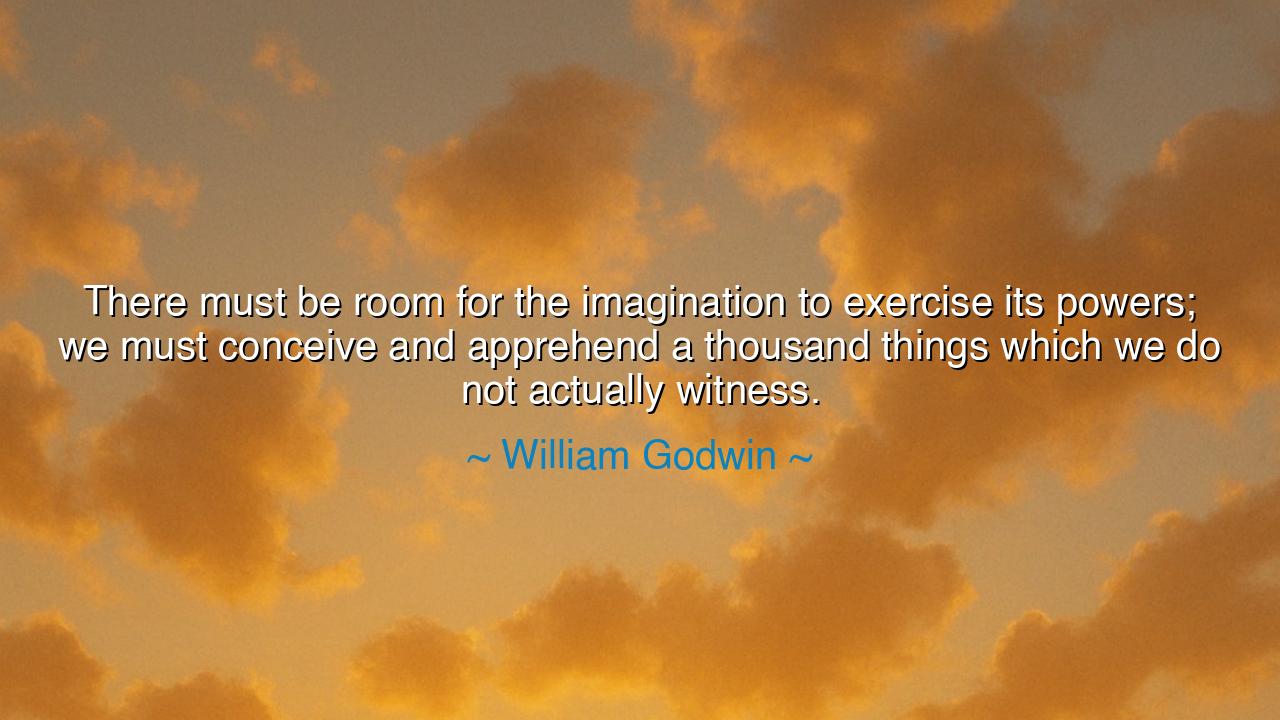
There must be room for the imagination to exercise its powers; we
There must be room for the imagination to exercise its powers; we must conceive and apprehend a thousand things which we do not actually witness.






“There must be room for the imagination to exercise its powers; we must conceive and apprehend a thousand things which we do not actually witness.” — thus spoke William Godwin, philosopher and father of the Romantic spirit that gave birth to new worlds of thought. In this profound saying, he teaches us that imagination is not a luxury, but a necessity — the sacred bridge between what we see and what we can become. His words come from an age when the mind was awakening from the rigid slumber of reason alone, when thinkers began to remember that truth is not found only in the visible, but also in the invisible — in dreams, in intuition, in the vast landscapes of thought that lie beyond the senses.
When Godwin speaks of making room for imagination, he speaks to a truth that is both intellectual and spiritual. The human soul, if confined only to what it can witness, becomes impoverished, a prisoner of the immediate and the measurable. But when it conceives and apprehends what lies beyond — the unseen, the yet-to-be, the possible — it becomes vast, creative, divine. The ancients understood this well. The philosophers of Greece, the poets of Persia, the prophets of every faith — all knew that what we call reality is only the surface of a deeper ocean. It is the imagination that dives beneath, that sees what cannot yet be seen, that envisions the shape of truth before it takes form.
To live without imagination is to live in exile from one’s own spirit. The mind then becomes a machine, recording what happens but never understanding why it matters. Godwin warns against such sterility — for the imaginative faculty is the source of empathy, invention, and wisdom. Through it, we learn to walk in another’s sorrow, to foresee the consequences of our actions, to dream of justice not yet known. It is through imagination that humanity built its cities, wrote its scriptures, and charted the stars. To deny it is to deny the very essence of being human.
Consider the example of Florence Nightingale, who, in the darkness of war and disease, saw beyond the filth and the despair of the field hospitals. Where others saw only suffering, she imagined order, compassion, and a new way to heal. It was not evidence that guided her, but vision — a conception of what could be, though not yet visible. Through that vision, she reformed medicine and saved countless lives. Her mind apprehended “a thousand things which she did not actually witness,” and from that unseen knowledge came light to the world. So it is always with those who dare to imagine.
Yet Godwin’s wisdom also speaks to the inner life. For imagination is not only the mother of art and science; it is the healer of the soul. When grief comes, it is imagination that helps us see meaning in the pain. When life wounds us, imagination builds the bridge to hope. It is the power that allows us to look upon the ruins of our dreams and envision their rebuilding. Thus, to “make room for imagination” is not merely to allow for creativity — it is to allow for healing, renewal, and faith in what lies beyond the horizon of the moment.
But imagination must be cultivated like a sacred garden. In a world that worships the immediate, the factual, and the seen, the imagination grows faint from neglect. We must nurture it — through reading, contemplation, and silence. We must learn again to see images in clouds, to hear music in wind, to find stories in the eyes of strangers. Every act of curiosity and wonder is an offering to the divine power that lives within us. When we “conceive and apprehend a thousand things,” we are not escaping reality; we are expanding it.
The lesson of William Godwin is thus timeless: that life without imagination is narrow, but life with imagination is infinite. Do not live only by what your eyes show you; live by what your spirit can envision. In every challenge, in every loss, ask not only, “What is?” but also, “What could be?” For it is in this question that civilization advances, art is born, and the human heart endures.
So, my children of the future, keep sacred the space within you where the unseen can dwell. Guard your imagination as a holy fire — feed it with learning, with wonder, with compassion. Conceive freely, and apprehend bravely, even that which others cannot yet see. For in doing so, you become co-creators with the universe itself — and through your imagination, the unseen becomes seen, the impossible becomes possible, and the future, once closed, opens wide before you.






AAdministratorAdministrator
Welcome, honored guests. Please leave a comment, we will respond soon